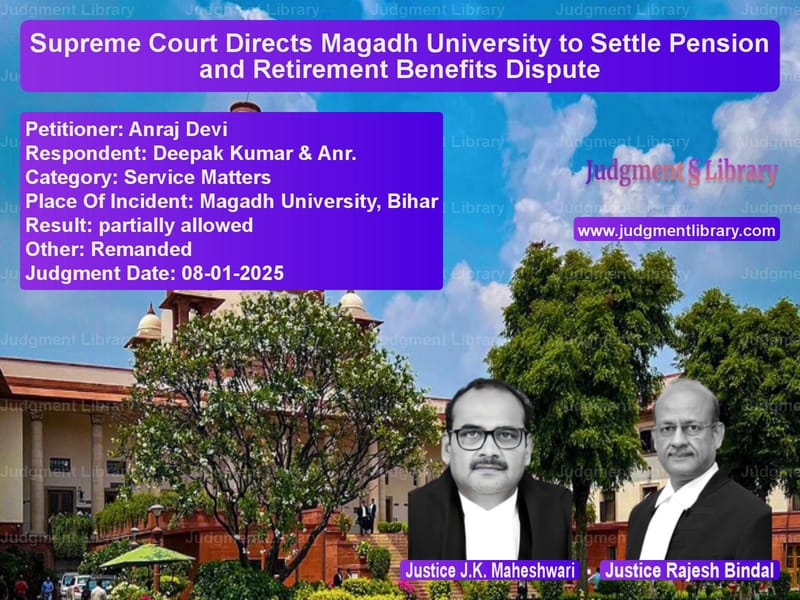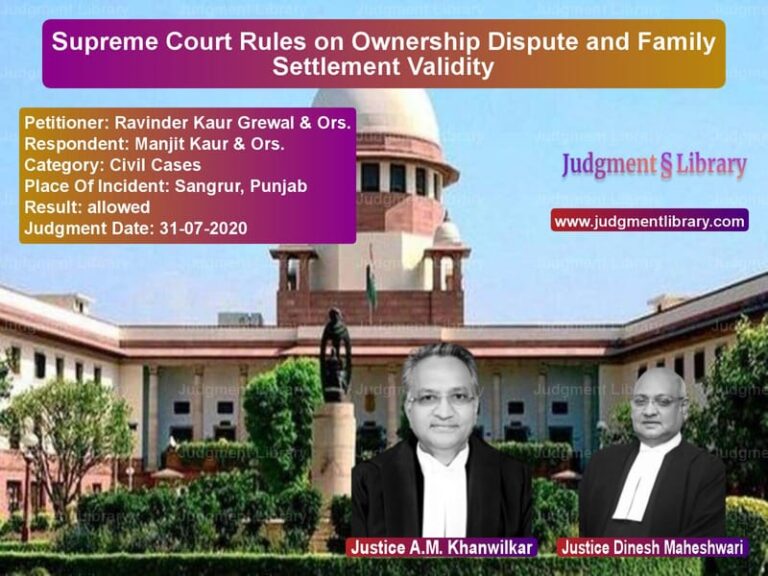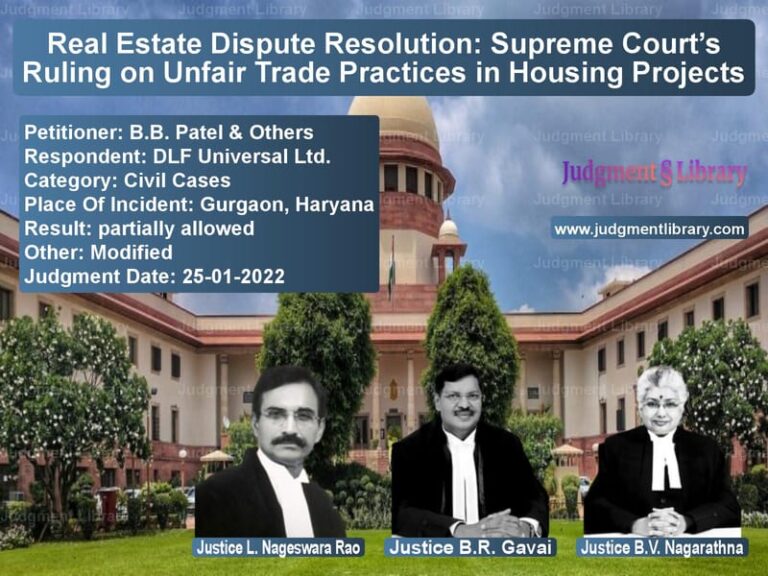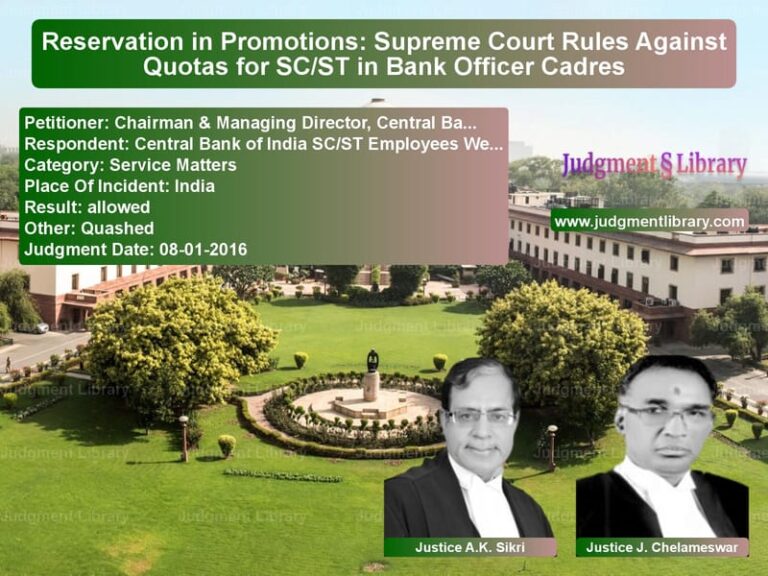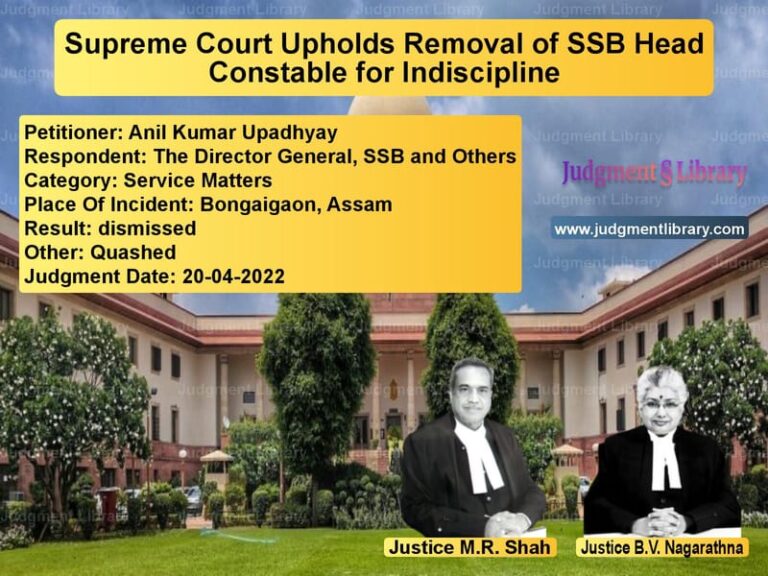Supreme Court Directs Magadh University to Settle Pension and Retirement Benefits Dispute
The Supreme Court of India, in the case of Anraj Devi vs. Deepak Kumar & Anr., delivered a significant ruling concerning the rights of retired government employees and the obligations of public institutions in processing pension and retirement benefits. This case involved a contempt petition filed by the petitioner, alleging non-compliance with a previous Supreme Court order directing the absorption and settlement of dues for university employees. The Court directed Magadh University to conduct a structured inquiry and ensure timely disbursement of financial benefits.
Background of the Case
The dispute originates from a previous Supreme Court ruling in Krishna Nand Yadav & Ors. vs. Magadh University & Ors., where the Court upheld the absorption of certain university employees based on the recommendations of the J. Sinha Commission. The petitioner’s husband, who served as a Store Keeper in K.S.M College, Aurangabad, was absorbed into Magadh University through a notification dated 18.09.2018, with retrospective effect from 10.12.1985. However, despite the Supreme Court’s ruling, the petitioner alleged that her husband’s pension and other post-retirement benefits were not processed.
Following the death of her husband, the petitioner was entitled to receive a family pension, but the university failed to act on her claims. She filed a contempt petition, arguing that the authorities had disregarded the Supreme Court’s previous directive, thereby violating her fundamental rights and causing financial distress.
Key Legal Issues
- Did Magadh University fail to comply with the Supreme Court’s previous ruling on employee absorption?
- Was the petitioner entitled to receive family pension and other post-retirement benefits?
- What legal remedies were available for the petitioner to enforce compliance?
Petitioner’s Arguments
- The Supreme Court had already confirmed her husband’s absorption, making him eligible for post-retirement benefits.
- Despite multiple representations, the authorities failed to process his family pension and other financial claims.
- Withholding payments without justification amounted to contempt of court.
- The family was facing severe financial hardship due to the delay.
Respondents’ Arguments
- The petitioner’s husband’s service records needed further verification before processing pension claims.
- Some procedural formalities had not been completed by the petitioner, delaying the settlement.
- The matter required administrative adjudication rather than a contempt proceeding.
Supreme Court’s Observations
1. Authorities Must Conduct a Fair Inquiry
The Court acknowledged that while procedural verifications were necessary, authorities could not indefinitely delay the settlement of dues.
“The petitioner’s family should not be made to suffer due to procedural delays. A fair and timely inquiry must be conducted to settle the claims.”
2. Directives for Family Pension and Post-Retirement Benefits
The Court issued specific instructions to expedite the resolution:
- The petitioner must submit a formal representation along with supporting documents.
- The Registrar/Vice Chancellor of Magadh University must conduct a detailed inquiry and verify service records.
- A reasoned order regarding the settlement of family pension and retirement benefits must be issued within three months.
- Payments must be processed within two months from the date of the order.
- If the petitioner is dissatisfied with the final order, she may approach the High Court.
3. Impact of Delay on the Petitioner
The Court noted that pension and retirement benefits are crucial for financial security. Unreasonable delays in processing such claims cause severe distress to dependents of deceased employees. The judgment emphasized:
“Pension is not a bounty but a right. Delay in processing pension claims is a violation of an individual’s right to a dignified life.”
4. University’s Responsibility to Comply with Court Orders
The Supreme Court reiterated that public institutions must comply with judicial directives. Failure to do so could attract contempt proceedings in the future. The judgment stated:
“Institutions must act in accordance with court orders without compelling affected individuals to pursue prolonged litigation.”
Final Verdict
- The Supreme Court directed Magadh University to resolve the pension dispute within a fixed timeline.
- The authorities were instructed to issue a reasoned decision after conducting an inquiry.
- The petitioner retained the right to seek further legal remedies if dissatisfied with the outcome.
Conclusion
This judgment underscores the importance of compliance with court orders in employment and pension-related matters. The ruling ensures that retired employees and their families receive the financial benefits they are entitled to, preventing unnecessary hardships due to bureaucratic delays. It serves as a reminder that pension and retirement benefits are fundamental rights that must be honored by public institutions without undue delay.
Petitioner Name: Anraj Devi.Respondent Name: Deepak Kumar & Anr..Judgment By: Justice J.K. Maheshwari, Justice Rajesh Bindal.Place Of Incident: Magadh University, Bihar.Judgment Date: 08-01-2025.
Don’t miss out on the full details! Download the complete judgment in PDF format below and gain valuable insights instantly!
Download Judgment: anraj-devi-vs-deepak-kumar-&-anr.-supreme-court-of-india-judgment-dated-08-01-2025.pdf
Directly Download Judgment: Directly download this Judgment
See all petitions in Pension and Gratuity
See all petitions in Employment Disputes
See all petitions in Public Sector Employees
See all petitions in Judgment by J.K. Maheshwari
See all petitions in Judgment by Rajesh Bindal
See all petitions in partially allowed
See all petitions in Remanded
See all petitions in supreme court of India judgments January 2025
See all petitions in 2025 judgments
See all posts in Service Matters Category
See all allowed petitions in Service Matters Category
See all Dismissed petitions in Service Matters Category
See all partially allowed petitions in Service Matters Category

